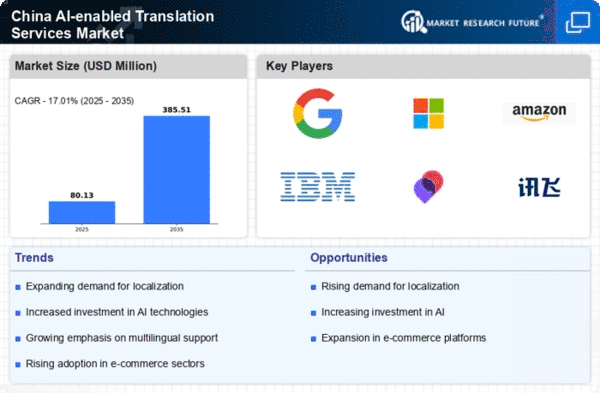Rising E-commerce Activities
The rapid expansion of e-commerce in China is a pivotal driver for the ai enabled-translation-services market. As businesses increasingly engage in cross-border trade, the need for accurate and efficient translation services becomes paramount. In 2025, e-commerce sales in China are projected to reach approximately $2 trillion, highlighting the necessity for multilingual support to cater to diverse consumer bases. This surge in online transactions necessitates the localization of product descriptions, customer service interactions, and marketing materials, thereby propelling demand for ai enabled-translation-services. Companies are likely to invest in these services to enhance user experience and improve conversion rates, indicating a robust growth trajectory for the industry.
Technological Advancements in AI
The continuous evolution of AI technologies is a significant driver for the ai enabled-translation-services market. Innovations in machine learning and natural language processing are enhancing the accuracy and efficiency of translation services. In 2025, advancements in AI algorithms are expected to improve translation quality by up to 30%, making these services more appealing to businesses. As companies increasingly recognize the value of real-time translation capabilities, the demand for AI-driven solutions is likely to rise. This technological progress not only streamlines communication but also reduces operational costs, thereby encouraging wider adoption of ai enabled-translation-services across various industries.
Government Initiatives and Support
The Chinese government has been actively promoting the adoption of artificial intelligence across various sectors, which significantly influences the ai enabled-translation-services market. Initiatives aimed at enhancing technological infrastructure and fostering innovation are likely to create a conducive environment for AI-driven solutions. In 2025, government funding for AI-related projects is expected to exceed $10 billion, which may facilitate advancements in translation technologies. This support not only encourages the development of sophisticated translation tools but also enhances the overall competitiveness of the industry. As a result, businesses are more inclined to integrate these services into their operations, further driving market growth.
Growing Need for Real-time Communication
In an increasingly interconnected world, the demand for real-time communication solutions is driving the ai enabled-translation-services market. Businesses in China are recognizing the necessity of instant translation services to facilitate seamless interactions with clients and partners globally. In 2025, it is projected that the market for real-time translation tools will grow by approximately 25%, reflecting the urgency for immediate language support. This trend is particularly evident in sectors such as customer service and international negotiations, where timely communication is crucial. As organizations strive to enhance their responsiveness and customer satisfaction, the reliance on ai enabled-translation-services is expected to intensify.
Increasing Globalization of Chinese Enterprises
As Chinese enterprises expand their operations internationally, the demand for ai enabled-translation-services is likely to escalate. The globalization trend compels companies to communicate effectively with foreign partners and customers, necessitating high-quality translation services. In 2025, it is estimated that over 50% of Chinese companies will have a presence in international markets, underscoring the importance of multilingual communication. This shift not only enhances brand visibility but also fosters better relationships with global stakeholders. Consequently, the ai enabled-translation-services market is poised for growth as businesses seek to bridge language barriers and enhance their global outreach.
















